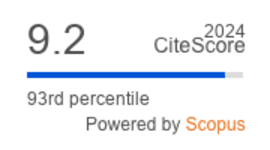Homology Modeling and Expression of Recombinant NS5-RdRp Based on the Indonesian Local Strain of Dengue Virus for Anti-Dengue Drug Development
DOI:
https://doi.org/10.36877/pmmb.a0000449Abstract
This study aims to isolate the RNA-dependent RNA polymerase (RdRp) gene of the dengue virus (DENV) isolates from Indonesia, determine the serotype of the local DENV strain through homology modeling, and express the recombinant RdRp protein in Escherichia coli BL21 (DE3), as the target for anti-dengue drug development. We utilize reverse transcription- polymerase chain reaction (RT-PCR) and nested PCR for serotyping the DENV isolates, obtained from Hasan Sadikin Hospital, Indonesia. Then, followed by the extraction and purification of the RdRp amplicon for gene sequencing. The resulting RdRp gene sequences are translated into amino acid sequences, which are then used for protein modeling and the construction of a recombinant plasmid for RdRp protein expression. As the result, the RdRp gene, which belongs to the non-structural protein 5 (NS5) of DENV, was successfully isolated and sequenced from DENV RNA samples. Based on serotyping results and homology modeling, the serotype of the isolate DENV was identified as serotype-3. The isolated NS5-RdRp gene from the local strain was then inserted into the pET28a(+) plasmid and transformed into E. coli BL21(DE3) as the host cell. Recombinant NS5-RdRp was predominantly found in the insoluble fraction with a molecular weight of 72 kDa. Future studies on the development of an anti-dengue drug model that confirms the inhibition of the binding domain in the recombinant RdRp protein structure will be required to provide more insight and expand the development of a universal anti-dengue strategy in Indonesia.
Downloads
Additional Files
Published
How to Cite
Issue
Section
License
Copyright (c) 2024 Toto Subroto, Ade Rizqi Ridwan Firdaus, Shinta Kusumawardani, Taufik Ramdani Tohari, Theresia Adventina Nababan, Wulan Pertiwi, Muhammad Fadhlillah, Sri Agung Fitri Kusuma, Yaya Rukayadi

This work is licensed under a Creative Commons Attribution-NonCommercial 4.0 International License.
Author(s) shall retain the copyright of their work and grant the Journal/Publisher right for the first publication with the work simultaneously licensed under:
Creative Commons Attribution-NonCommercial 4.0 International (CC BY-NC 4.0). This license allows for the copying, distribution and transmission of the work, provided the correct attribution of the original creator is stated. Adaptation and remixing are also permitted.

This broad license intends to facilitate free access to, as well as the unrestricted reuse of, original works of all types for non-commercial purposes.
The author(s) permits HH Publisher to publish this article that has not been submitted elsewhere.



.png)

.jpg)
